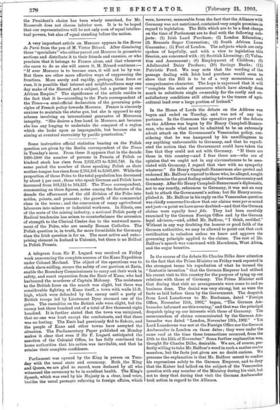In the course of the debate Sir Charles Dilke drew
attention to the fact that the Prime Minister on Friday week repeated in the strongest terms his repudiation of what he termed the "fantastic invention " that the German Emperor had utilised his recent visit to this country for the purpose of tying up our relations with those of Germany. The Prime Minister said that during that visit no arrangements were come to and no business done. The denial was very strong, but so were the facts as laid before them by the Government. The despatch from Lord Lansdowne to Mr. Buchanan, dated " Foreign Office, November 11th, 1902," began, "The German Am- bassador informed me this evening," and that was the principal despatch tying up our interests with those of Germany. The memorandum of claims communicated by the German Am- bassador was dated "London, November 13th, 1902." "Yet Lord Lansdowne was not at the Foreign Office nor the German Ambassador in London on those dates ; they were under the same roof at the time these transactions occurred, from the 10th to the 15th of November." Some further explanation was, thought Sir Charles Dilke, desirable. We are, of course, per- fectly willing to take Mr. Balfour's word in such a matter contra mundum, but the facts just given are no doubt curious. We presume the explanation is that Mr. Balfour meant to confine his expressions solely to the German Emperor, and to deny that the Kaiser had talked on the subject of the Venezuelan question with any member of the Ministry during his visit, but not to deny that during that visit the German Ambassador took action in regard to the Alliance.










































 Previous page
Previous page